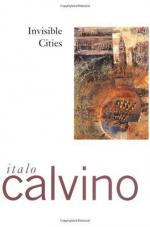
|
| Name: _________________________ | Period: ___________________ |
This test consists of 15 multiple choice questions and 5 short answer questions.
Multiple Choice Questions
1. If a traveler walks into Zemrude with his head held high, how does he see the city?
(a) From below.
(b) Vibrant.
(c) Directly in front.
(d) Through a mist.
2. In order to really understand the language of Hypatia, what must Polo do?
(a) Learn a new set of written symbols.
(b) Spend at least two months there.
(c) Free himself from images.
(d) Better understand the hand gestures.
3. When the emperor and the traveler grow quiet in order to reflect on what was just said, the emperor sometimes:
(a) Stares at Polo piercingly.
(b) Imagines Polo answering his questions.
(c) Weeps quietly.
(d) Clears his throat loudly.
4. What does Polo say he gauges everywhere he travels to?
(a) Amount of happiness left in the empire.
(b) Wealth of each region.
(c) The level of dissent in each city of the empire.
(d) Military strength of every location.
5. As Kublai Khan listens to the reports of his envoys and tax collectors while walking through his garden, his messengers speak in languages that:
(a) He developed.
(b) They made up.
(c) He doesn't understand.
(d) Are understood only by members of royalty.
6. What does Polo see rising vertically in Armilla?
(a) Tall, slender windmills.
(b) Pipes where the houses should be.
(c) Stacks of seashells.
(d) Columns that hold nothing up.
7. What tangible items do merchants trade in Euphemia?
(a) Silk fabrics as well as silk worms.
(b) Curry powder and white and green tea.
(c) Gunpowder and fireworks.
(d) Poppy seeds, grain, and nutmeg.
8. When Polo first communicates with Khan, the emperor is able to:
(a) Decipher his signs.
(b) Understand everything completely.
(c) Comprehend his unusual accent.
(d) Look interested despite being bored.
9. Polo explains that if he describes Olivia as rich in products and profits, the emperor should realize that:
(a) Ash falls regularly on the streets and rivers from the efforts of its industrious people.
(b) The city also contains fine palaces, exotic creatures, soot , grease, and desperation.
(c) It is one of the most prosperous and exotic cities in the empire.
(d) Its people are well off and need to share their riches with others in the empire.
10. When Khan describes cities to Polo, what does he tell Polo to do?
(a) Tell him if they exist.
(b) Tell him whether or not he's been there.
(c) Predict their future success.
(d) Offer what is most beautiful in each city.
11. Which is the city of a thousand wells, sitting above an underground lake?
(a) Laura.
(b) Isaura.
(c) Zirma.
(d) Tamara.
12. If a traveler walks into Zemrude with his head held down by grief, how will he see the city?
(a) In decline.
(b) Brilliantly lit.
(c) Void of color.
(d) From above.
13. At the conclusion of Chapter 1, Khan is completely satisfied with Polo's explanations but still remembers what?
(a) The symbols and emblems Polo once used.
(b) That Polo used to lie to him.
(c) To pretend to question Polo's accuracy.
(d) How ridiculous Polo looked when he used more gestures.
14. Khan tells Polo about his dreams of a city where the farewells from its harbor are what?
(a) Indifferent.
(b) Joyous and celebratory.
(c) Insincere.
(d) Tearful but silent.
15. Once Polo is able to speak a language that Khan understands, he can:
(a) Demand greater pay.
(b) Be arrogant and disagreeable.
(c) Be very precise in his descriptions.
(d) Request to go on more voyages.
Short Answer Questions
1. Why does Polo initially rely on symbols to represent people and places?
2. Moving southward for three days from the city of Zaira, what city would one encounter?
3. When Polo goes to Hypatia, what does he learn?
4. This peninsular city can be reached by ship or camel, revealing itself to travelers by both land and sea:
5. Anastasia is described as being full of precious and mundane objects such as:
|
This section contains 646 words (approx. 3 pages at 300 words per page) |

|




